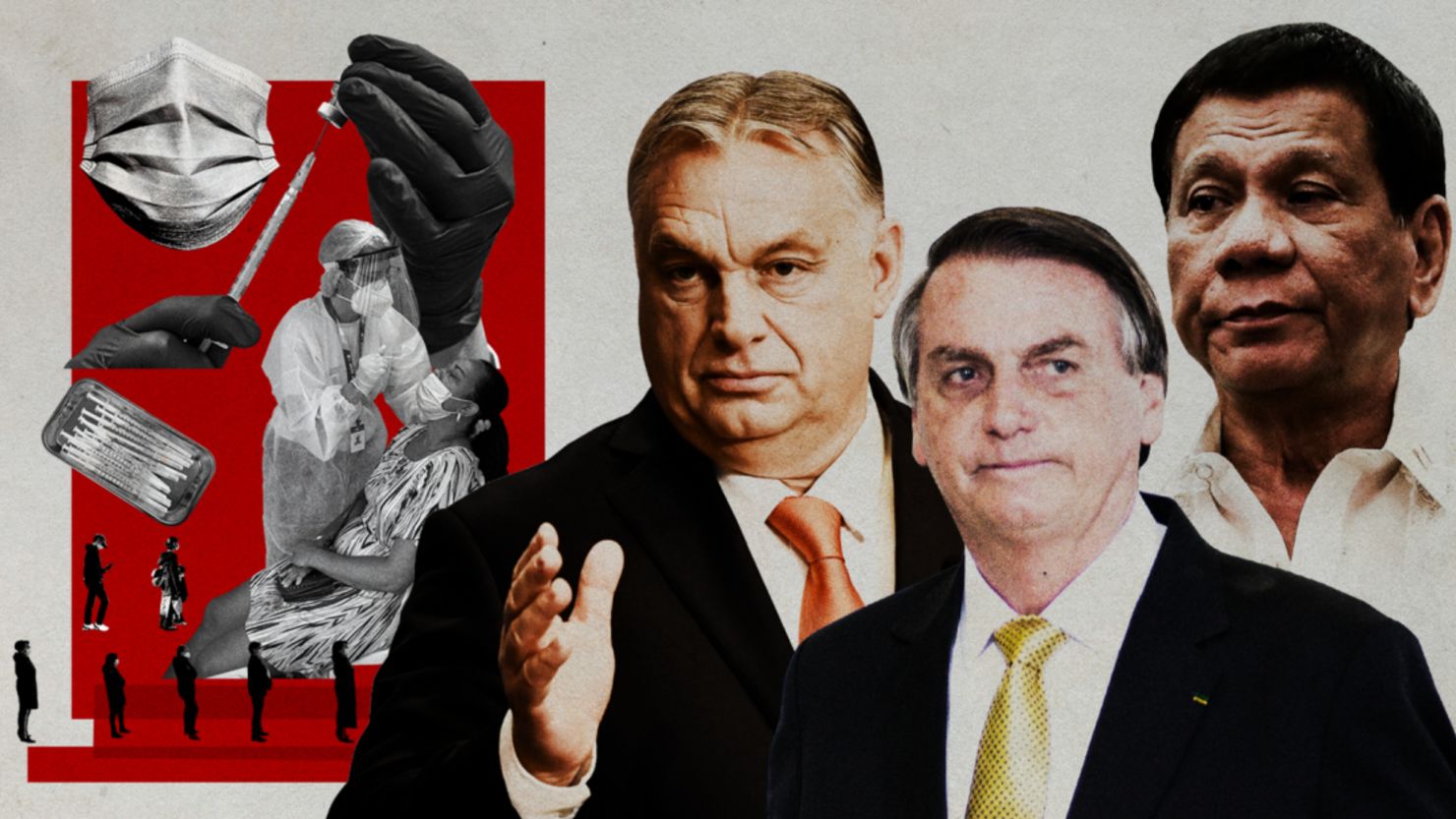Editor’s Note: Ruth Ben-Ghiat (@ruthbenghiat), a frequent contributor to CNN Opinion, is professor of history and Italian studies at New York University and the author of “Strongmen: Mussolini to the Present.” She publishes the newsletter Lucid on threats to democracy. The views expressed here are her own. Read more opinion on CNN.
This will be a fateful year for autocrats around the world.
In Brazil and Hungary, strongman leaders Jair Bolsonaro and Viktor Orbán are standing for re-election. In the Philippines, term limits are bringing Rodrigo Duterte’s tumultuous presidency to an end. While in the United States, midterm elections held under the shadow of the false Republican claim that Joe Biden “stole” the 2020 election from Donald Trump could give an authoritarian-leaning GOP control of Congress.
2022 is also the third year of the Covid-19 pandemic, which has been a double-edged sword for autocratic leaders who privilege the maintenance of their personal power over public welfare. Some, like Hungary’s Orbán, have used it to accumulate more authority. In March 2020, he capitalized on the state of emergency in Hungary to rule by decree. Others, like Trump, who governed in a still-robust democracy, found out that mismanagement of the crisis could end in their defeat.

The pandemic has been a stress test for both democratic and authoritarian governments. Around the world, it has worsened existing economic inequities and caused immense loss of life: Over 5.5 million deaths have so far been recorded by John Hopkins University and others. By making painfully clear the costs of corrupt and callous leadership, it has also infused social justice movements around the globe with new vigor and clarity.
Strongman leaders are particularly susceptible to coming undone by a global health emergency like Covid-19. In some cases, their arrogance downplaying the seriousness of coronavirus – and its fatal consequences – can be directly compared with how other countries handle the very same threat. Citizens can see the virus doesn’t bow down to strongman commands – it follows scientific rules.
Let’s look at how Covid-19’s impact may be felt in electionsto be held in hotspots of autocracy this coming year.
First up is Orbán. Hungary’s prime minister faces a challenge in the April parliamentary election from a newly unified opposition. Six parties are putting aside their political differences to run jointly against what coalition leader Peter Marki-Zay calls a “corrupt dictatorship.” Orbán’s advantage as the incumbent may be magnified by a repeat of gerrymandering, vote rigging and other tactics that critics say altered the outcome of the 2018 election.
While Orbán appeals to voters with economic relief (tax rebates, pension and wage increases), the concentration of wealth among his cronies, including from EU contracts, stands out at a time of pandemic-fueled inflation and misery. Orban’s government spokesman, Zoltan Kovacs, brushed off these allegations to CNN at the time, saying it was “up to the courts to decide” in such cases.
Nor does Hungary’s lack of transparency about public health data inspire trust. Hungary has no official Covid-19 dashboard of trends and geographic breakdowns (though it does have an official government website including daily deaths and infections) and crackdowns on press freedoms make reporting on the pandemic difficult. Orbán may be the darling of the American GOP, but the unprecedented alliance of parties against him speaks to a decline in his authority.
Next we turn to the Philippines. In May, Filipinos will reckon with the consequences of a leader who uses force to cover his lack of rigorous policies, including in public health matters. Critics charge that outgoing president Duterte has exploited his emergency powers to suppress freedom of speech (his loyalists shut down the ABS-CBN media network by not passing bills that would have granted it a new license) and passed economic measures that benefited big business and foreign investors, rather than the sick and the jobless. Mass vaccinations only started in March 2021, and Duterte’s response – “I’ll have you arrested and I’ll inject the vaccine in your butt” – sums up his attitude toward those he governs.
While the investigation by the Hague-based International Criminal Court into Duterte’s use of extrajudicial violence in his war on drugs is on hold, he will not be standing for re-election due to term limits. As of writing, Duterte is not endorsing any candidate – including Ferdinand “Bongbong” Marcos Jr., who is running for president with Duterte’s own daughter, Sara Duterte, and is the son of the late dictator Ferdinand Marcos.
This volatile situation could help opposition candidates like Leni Robredo, the current vice president. Her progressive “pink revolution” has about 700,000 volunteers working in over 200 organizations. Robredo challenges not just Duterte’s agenda, but longstanding nostalgia for the original Marcos – another despot who failed to provide for his people in their time of need.
The same could be said of Brazil’s Bolsonaro, who is up for re-election in October. The president deployed the strongman’s playbook in using misinformation to downplay the severity of Covid-19; in firing experts, like his health minister, Luiz Henrique Mandetta, who contradicted him in recommending social distancing; and rejected offers from manufacturers of vaccines for the ailing Brazilian population. Even cash-transfer payments given to the poor as pandemic relief have not saved his approval rating, which plummeted in November.
That has fueled support for the opposition candidate, former president Luiz Inácio Lula da Silva, a leftist who was jailed in 2018 on corruption and money laundering charges. Da Silva always attributed those charges to political machinations, and they were recently annulled. He has called Bolsonaro “an agent of genocide” for his pandemic negligence. A Brazilian congressional panel agrees; in October it recommended that Bolsonaro be charged with “crimes against humanity.”
Meanwhile Bolsonaro is adamant he’s not going anywhere, as he told local media in August: “My message is: only God takes me out of that post,” raising the prospect that he’d refuse to accept an electoral loss. Yet any such authoritarian action is likely to go badly for him given his low popularity.
Around the world, the pandemic has accelerated in many the feeling that the autocratic model of governance, with its suppression of freedoms, plunder of the environment and creation of oligarchies, has run its course.
The recent Chilean presidential elections may herald the ascent of a new generation of leaders attentive to economic and racial inequality and the costs of dismantling social safety nets. The leftist Gabriel Boric, a 35-year-old former student activist, defeated the 55-year-old former congressman José Antonio Kast, who praised Chilean dictator Augusto Pinochet and his regime known for its violence and neoliberal policies.
It could be an early sign that a desire for more accountable, transparent, and democratic leadership is emerging from the calamity of Covid-19.


